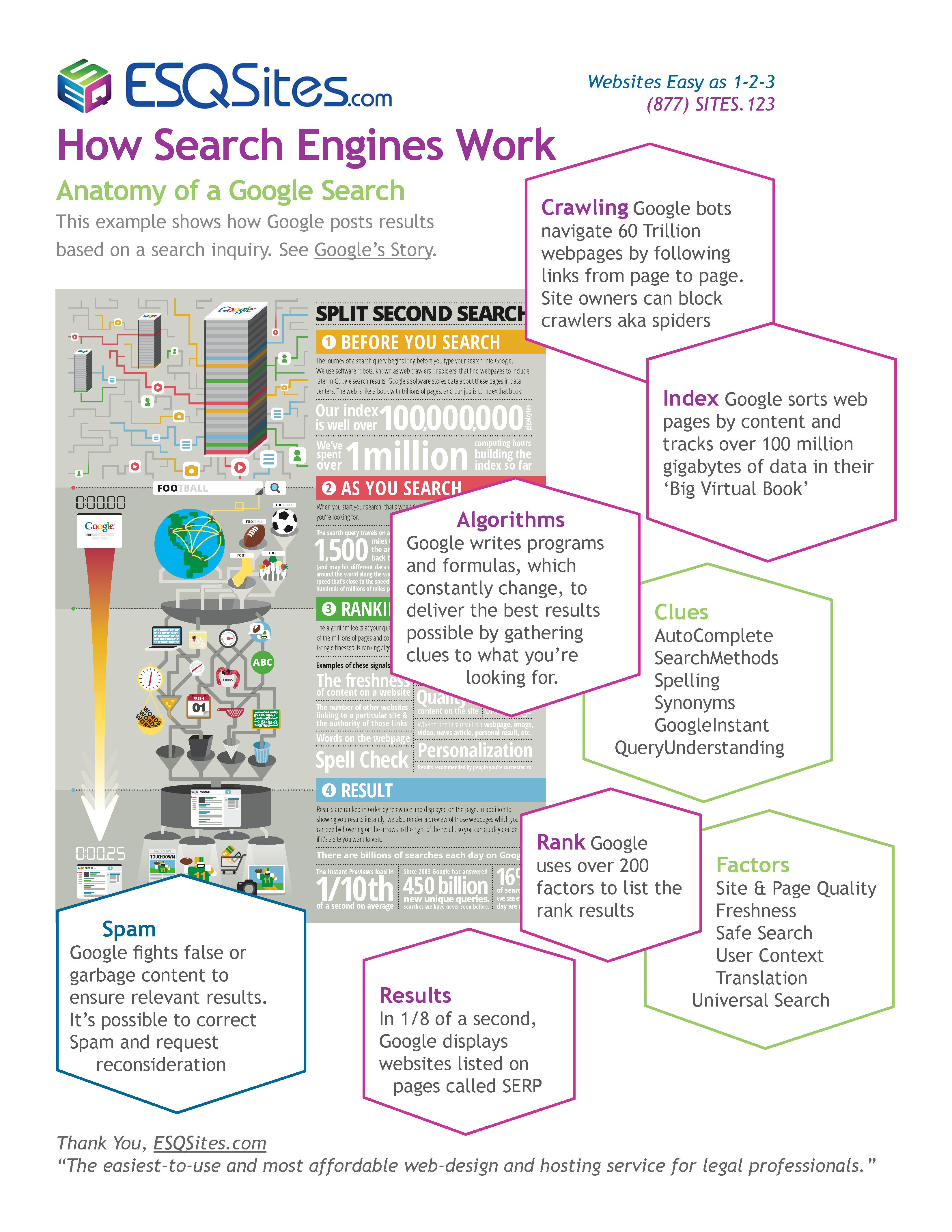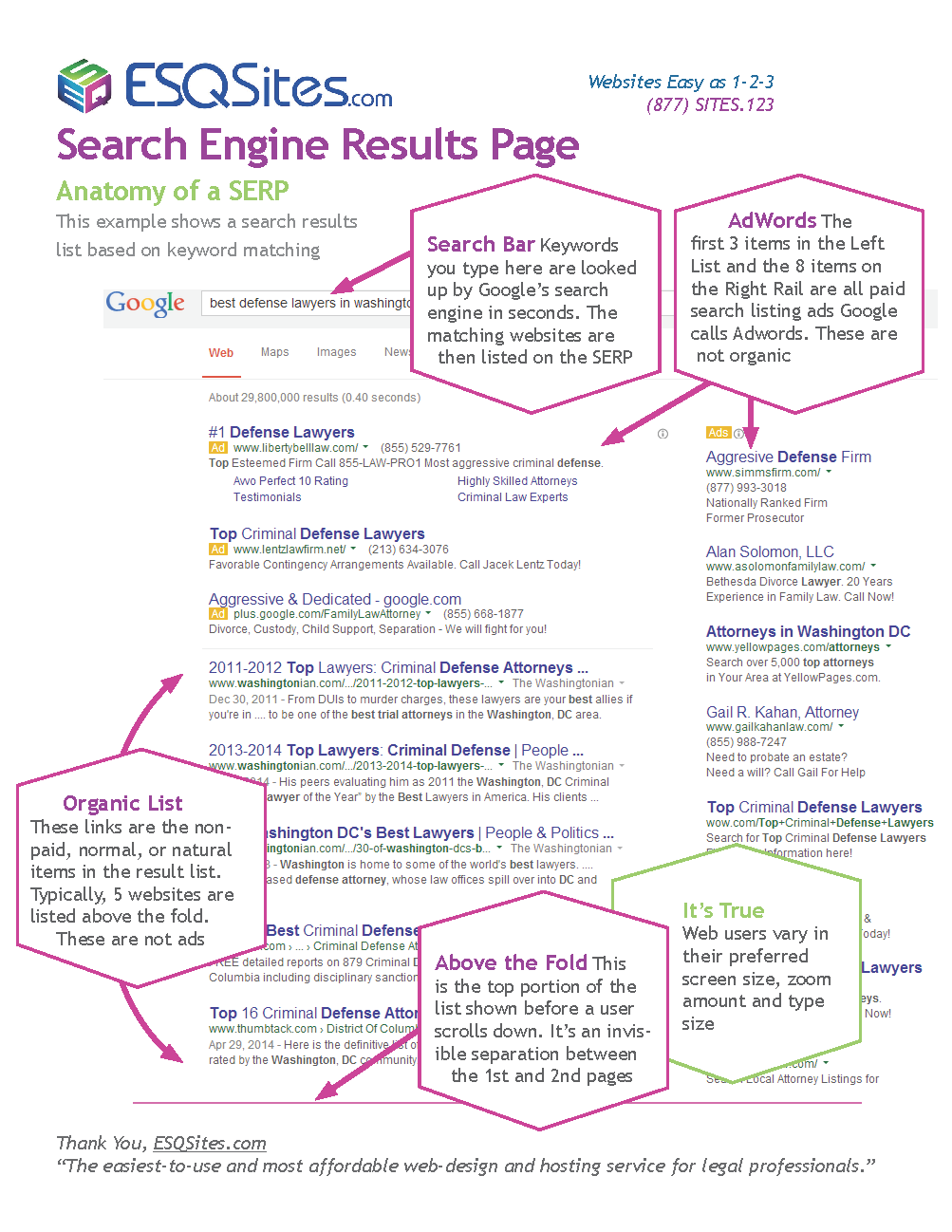What is SEO?
SEO is an acronym; The letters stand for Search Engine Optimization. Search Engine Optimization is a process of increasing the likelihood that your website will rank highly on a Search Engine Results Page or SERP. When a web user types text (keywords) in URL or search bar to look up a service or product, a search engine finds matching websites and lists those relevant websites in a results page for the user to select. When a user clicks on a posted website link, the specific website address page is presented to the user.
What is a search engine?
Search engine is the function to generate search results on a page. Google, the most widely used search engine, uses hundreds of complex algorithms to search (index) and match keywords from the text entered in a search bar to post websites listed on a SERP. Please see Google's story on How a Search Works.

Please open the How SEs Work PDF version by clicking the image, this link or on the attached PDF listed below.
What is a SERP?
SERP is an acronym; The letters stand for Search Engine Results Page.
You want your website to land on the first page of the SERP, as 92% of users click on links listed on the first page. (Statistical data source: Chitika.com).
Please see How do I Improve My Rank to learn about how many clicks the first and second listing garnish.

Please open the SERP PDF version by clicking the image, this link or on the attached PDF listed below.
How do I improve my online results?
You possess the ability to improve your rank, traffic and exposure! Did you know, half of all visitors will click on the first or second website posted in the organic search-result list? (Statistical data source: SmartInsights.com) You can definitely influence your SERP results with an investment of your time. Your website's content should be informational to the extent it is instructional and beneficial. Search engines are now focusing on providing answers not just links, so be sure to include "legal benefits" (not complicated legalese or egocentric self promotion) to your potential clients. Use concise, robust, relevant, detailed, organized language that represents your firm while speaking to a human audience. Your content, blog and social activities should be updated frequently and be sure to tout your uniqueness by "out-comparing" the competition. ESQSite's allows you the ability to easily enter detailed content, name your titles and assign keywords.
SEO is an acronym; The letters stand for Search Engine Optimization. Search Engine Optimization is a process of increasing the likelihood that your website will rank highly on a Search Engine Results Page or SERP. When a web user types text (keywords) in URL or search bar to look up a service or product, a search engine finds matching websites and lists those relevant websites in a results page for the user to select. When a user clicks on a posted website link, the specific website address page is presented to the user.
What is a search engine?
Search engine is the function to generate search results on a page. Google, the most widely used search engine, uses hundreds of complex algorithms to search (index) and match keywords from the text entered in a search bar to post websites listed on a SERP. Please see Google's story on How a Search Works.

Please open the How SEs Work PDF version by clicking the image, this link or on the attached PDF listed below.
What is a SERP?
SERP is an acronym; The letters stand for Search Engine Results Page.
You want your website to land on the first page of the SERP, as 92% of users click on links listed on the first page. (Statistical data source: Chitika.com).
Please see How do I Improve My Rank to learn about how many clicks the first and second listing garnish.

Please open the SERP PDF version by clicking the image, this link or on the attached PDF listed below.
How do I improve my online results?
You possess the ability to improve your rank, traffic and exposure! Did you know, half of all visitors will click on the first or second website posted in the organic search-result list? (Statistical data source: SmartInsights.com) You can definitely influence your SERP results with an investment of your time. Your website's content should be informational to the extent it is instructional and beneficial. Search engines are now focusing on providing answers not just links, so be sure to include "legal benefits" (not complicated legalese or egocentric self promotion) to your potential clients. Use concise, robust, relevant, detailed, organized language that represents your firm while speaking to a human audience. Your content, blog and social activities should be updated frequently and be sure to tout your uniqueness by "out-comparing" the competition. ESQSite's allows you the ability to easily enter detailed content, name your titles and assign keywords.
Please see ESQSites' list of Common Influential Rank Factors that you can control to increase your website's presence.
Again, the quality of your content is intensely influential in achieving high organic ranking, traffic and exposure, whether you've purchased online paid-advertising or not.
Does ESQSites offer SEO?
Yes. Please see ESQSites' Meta Tags or SEO cost or Common Influential Rank Factors.
How much does SEO cost?
SEO Meta Tags are free through ESQSites! Please see Meta Tags below or ESQSites' Meta Tag Instructional.
Please contact ESQSites' for a range of SEO packages at our email ESQSites or call 877.ESQ.Sites. There are other 3rd party SEO providers outside of ESQSites.
What are Meta Tags?
Search engines use Meta Tags or 'query-able' text, to interpret your website and generate search results based on data you provide. ESQSites has three available Meta Tag fields for you to complete. Title, Description and Keywords can be accessed in the "SEO and Meta Settings" area by clicking the “Pages” icon from the "Your Website” section. Ideally, you'll wish to complete your Meta Tag fields for each active page.
Please see ESQSites' Meta Tag Instructional and ESQSites' SEO of PDFs Instructional.
What are keywords?
Keywords are words or a group of words that online users type into the URL or Search fields to locate relevant websites. To learn more, see Google's Keyword Planner tool.
Why are keywords important?
Customers click on list results that are top-ranked. Your website can be keyword-optimized to heighten your rank, therefore potentially increasing your customer base.
How soon will I begin to see my domain come up on a Google Search?
Domain names and 'your own name' searches can show up within hours.
Generic searches (i.e. Attorney in XGeoArea) can take a few days. It takes time (typically 1-2 days) for the search engines to index your website using their crawlers. Please see ESQSites' How Search Engines Work PDF.
Why is my site not on the internet?
Point-To set up can take up to 72 hours or if you're using a 3rd party registrar for your Domain Name, you must direct the Point-To; Please see this IMPORTANT ESQSites' How To Change Your DNS "A" Record Instructional.
How long does it take for my site to get on the web?
48-72 hours; Usually within hours as our servers update frequently.
How come I don't see my website when I Google it?
It takes days for Search Engines to index your website with their "crawlers". Generic searches (i.e. Attorney in XGeoArea) can take a few days, but typically 1-2 days or less. Please see ESQSites' How Search Engines Work PDF.
Search Engines directly impact your traffic. Ranking high on the first page of an organic search results list maximizes the likelihood of the user clicking on your link to call up your website! Viewers see your website after searching for keywords, reviewing the list of ranked findings and choosing a site via their clicked selection. Search engines continually crawl web pages and index published data.
To increase visits to your site, please see How do I Improve My Rank and see ESQSites' Marketing SEO Instructional.
What is Google Analytics?
Google Analytics is a service that generates detailed statistics about a website's traffic. Google Analytics report how many potential clients visit your website, where they come from, page navigation, time spent per page, etc.
Ideally, you'll wish to minimally sign up for the free basic Google Analytics account. Once you have your assigned Tracking Code from Google Analytics, enter the code at ESQSites.com by clicking the “Google Analytics” icon from the "Your Website” section.
Please see ESQSites' Google Analytics Instructional.
Why is SEO critical to my business?
More customers equals profitability for your company. Millions of online users can become your customer simply by searching for a need and clicking on your website listing.
What kind of results should I expect from SEO?
Depends on your investment management; the more time you spend on keywording your website, updating with quality content and links, and targeting your audience with paid ads, the better your results. To learn more, see Google's AdWords or please see ESQSites' Marketing SEO Instructional.
What is a URL?
URL is an acronym; The letters stand for Uniform Resource Locator. A URL is the complete name of a website address. A URL will contain at least the Domain Name, and typically also possesses the subdomain, category and subcategory names which can appear before and after the root Domain Name with symbol separations.
More customers equals profitability for your company. Millions of online users can become your customer simply by searching for a need and clicking on your website listing.
What kind of results should I expect from SEO?
Depends on your investment management; the more time you spend on keywording your website, updating with quality content and links, and targeting your audience with paid ads, the better your results. To learn more, see Google's AdWords or please see ESQSites' Marketing SEO Instructional.
What is a URL?
URL is an acronym; The letters stand for Uniform Resource Locator. A URL is the complete name of a website address. A URL will contain at least the Domain Name, and typically also possesses the subdomain, category and subcategory names which can appear before and after the root Domain Name with symbol separations.
-End of Topic-
For other related topics, please see Hosting or Domain Names
Thank You for using ESQSites.
"Web design and hosting service for legal professionals."
Thank You for using ESQSites.
"Web design and hosting service for legal professionals."
